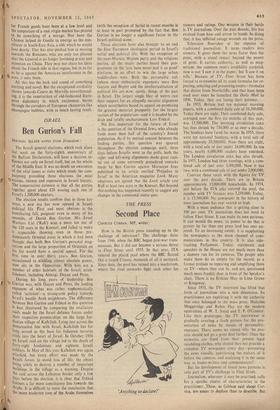ISRAEL
Ben Gurion's Fall
MICHAEL SELZER writes from Jerusalem : The Israeli general elections, which took place last week on the forty-eighth anniversary of. the Balfour Declaration, will have a decisive in- fluence not only on Israel itself, but on the whole of the Middle East. It was no doubt an awareness of the vital issues at stake which made the cam- paigning preceding these elections the most 7$-Vicious, intense and expensive in Israeli history. The conservative estimate is that all the parties together spent about £20 wooing each one 'of Israel's 1,200,000 electors.
The election results confirm that in three key areas a new era has now opened in Israeli Political life. First and most obvious is the humiliating fall, poignant even to many of his enemies, of David Ben Gurion. His Israel Workers List ('Raft') won a mere ten out of the 120 seats in the Knesset, and failed to make a respectable showing even in those pre- dominantly Oriental areas in which it had been thought that both Ben Gurion's personal mag- netism and the large proportion of Orientals on his list would have a special appeal. .For the first time in over thirty years, Ben Gurion, accustomed to wielding almost absolute power, now sits in the Opposition. With him are a number of other habitués of the Israeli estab- lishment, including Almogi, Dayan and Peres.
During his long years of leadership Ben Gurion was, with Dayan and Peres, the leading exponent of what was rather euphemistically called 'activism'—a strong-arm policy towards Israel's hostile Arab neighbours. The difference between Ben Gurion and Eshkol in this question is best illustrated by comparing the retaliatory raids made by the Israel defence forces under their respective premierships on the large Jor- danian village of Kalkilieh. Lying just across the demarcation line with Israel, Kalkilieh has for long served as the base for fedayeen terrorist raids into the heart of ,Israel. In October 1956 an Israeli raid on the village led to the death of forty-eight Jordanians and eighteen Israeli soldiers. In May of this year Kalkilieh was again attacked, but every effort was made by the Israeli forces to avoid loss of life, the object being solely to destroy a number of important buildings in the village as a warning. Despite the raid across the Lebanese border only a few days before the election, it is, clear that Eshkol favours a far more conciliatory line towards the Arabs. It is difficult to resist the conclusion that the more moderate tone of the Arabs. themselves (with the exception of Syria) in recent months is at least in part prompted by the fact that Ben Gurion is no longer a significant factor in the Israeli political scene.
These elections have also brought to an end the East European ideological period in Israel's social and political life. With the exception of the near-Marxist Mapam party and the religious parties, all the major parties based their pro- grammes on the `you have never had it so good' platform, in an effort to win the large urban middle-class vote. Both the personality cult (whose most enthusiastic exponents were Ben Gurion and Begin) and the intellectualisation of political life are now, surely, things of the past in Israel. The largest single bloc of voters cast their support for an allegedly socialist alignment which nevertheless based its appeal on promising the _greatest material prosperity for the largest section of the population—and it is headed by the • drab and totally uncharismatic Levi Eshkol.
No less important for the future of Israel is the question of the Oriental Jews, who already form more than half of the country's Jewish population. As if by mutual consent between the leading parties, this question was ignored throughout the election campaign until, three days before Israelis went to the polls, both the right- and left-wing alignments made great capi- tal out of some extremely prejudiced remarks made by Ben Gurion against Moroccan Jews published in an article entitled Prejudice in Israel' in the American magazine Look. Many observers are agreed that the Look article cost Rafi at least two seats in the Knesset. But beyond this nothing has happened recently to suggest any changes in the communal status quo.














































 Previous page
Previous page